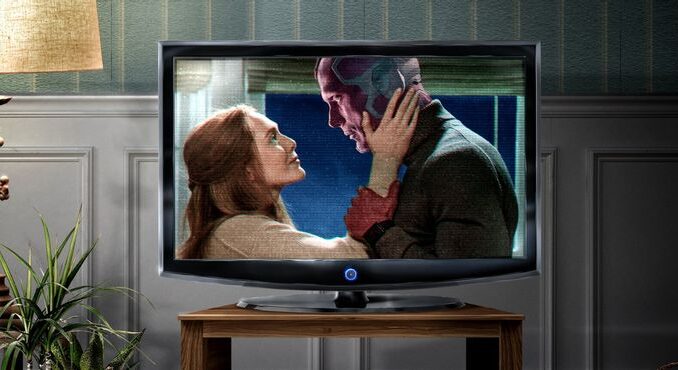
Across over a decades-worth of films, stories and characters that made up the first three “phases” of the Marvel Cinematic Universe, things got pretty formulaic: Hero; villain; big battle; triumphant victory. Throw in the occasional heartwarming (or heartbreaking) moment, brief glimpse of our hero faltering and a sprinkle of humor, and the line between “Iron Man,” or “Captain America” or “Captain Marvel” became increasingly blurred.
The strategy worked for Marvel, though; “Black Panther” was nominated for Best Picture at the Academy Awards, every film they released packed theaters and at the close of the decade, “Avengers: Endgame” became the highest-grossing film of all time. Why fix something that isn’t broken?
Maybe that question — posed by fans and critics of Marvel alike — is what makes “WandaVision” so exciting. The first of a long list of Marvel original releases planned for Disney Plus, the series — starring Elizabeth Olsen and Paul Bettany, reprising their roles as Avengers Scarlet Witch and Vision — subverts all expectations of what a “superhero” story could look like.
The series is a slow burn — quite unlike the Marvel we’ve grown accustomed to, whose stories almost always start with a (sometimes literal) bang. For the first two episodes, “WandaVision” plays beat-for-beat like a sitcom; Episode one pays homage to ‘50s classics like “The Dick Van Dyke Show” and “I Love Lucy,” while episode two time-jumps to the ‘60s, drawing from “Bewitched” for inspiration.
Despite the lighthearted tone of the episodes, there’s an ever-present unease watching Wanda (who we last saw almost single handedly defeating Thanos thanks to a combination of grief, anger and strength) and Vision (who we last saw … literally die) play their parts to a tee: Wanda, the sharp-yet-unassuming housewife and Vision, her breadwinning, hardworking husband.
This tension is only heightened when we get glimpses of the facade cracking; Vision’s boss choking while the surrounding players laugh it off, a distant voice attempting to reach Wanda through a radio, the mysterious beekeeper emerging from a sewer. In these moments, Wanda panicked; scenes cut, jumped or rewinded and hints were dropped that she had some control over … whatever was happening in the fictional town of Eastview.
By the end of episode four — which takes us outside of Eastview and adopts a tone more similar to the aforementioned classic Marvel-style — this is all but confirmed. With four episodes remaining, the gravity of Wanda’s control over the town and its residents has yet to be explored, but is sure to be the topic at hand as the series comes to a close.
“WandaVision” is the most refreshing story based on a comic book in decades. It’s not just “good for a Marvel show;” it’s good, period. It takes the best thing about Marvel — the high-stakes, edge-of-your-seat feeling — and flips every other convention on its head.
The performances, too, transcend the common Marvel-quality. Elizabeth Olsen, criminally underused in the films featuring Scarlet Witch (the strongest Avenger, fight me please), shines here. As someone who famously started the cheers for Wanda’s return during “End Game,” it’s a joy to see the character get her moment, and it’s an even greater joy to see Olsen capitalize on it.
Not only does she play up sitcom caricatures while avoiding parody, but also effortlessly executes the moments that call for a grief-stricken Wanda who’s slowly losing control. It’s stunning character work, and if “The Mandalorian” can rack up Emmy nominations, then I’m starting her campaign as we speak.
Disney Plus is a scary concept; one of the world’s largest media conglomerates creating a platform where original content can be churned out faster than we can catch up. At the same time, it’s provided a clear safety net for major studios (like Marvel) to experiment with convention-breaking projects like never before. If the rest of the content Marvel has planned for the streamer (and there is so, so much of it) is anything like “WandaVision,” well … capitalism may have won this round.
